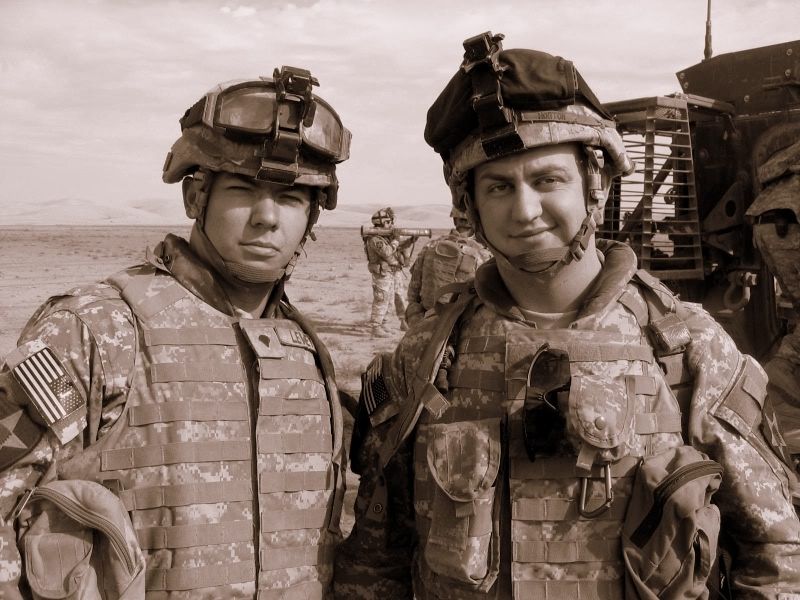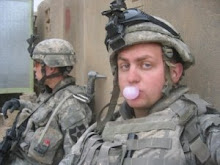Dear President Obama,
This letter comes to you from an unlikely supporter: a young Iraq War vet from the blood-red state of Texas. As an Army recruit in basic training, I cast my vote for George W. Bush in 2004 because I felt he was the best choice for a responsible prosecution of the wars in Iraq and Afghanistan. Five years and a combat tour later, I have come to understand the consequences of that decision. Last November I pulled the lever for you after hearing about the refreshing notion of a new era of government accountability that never existed in my adult life. I was sold when you promised to end the practice of involuntary mobilization, a program that reactivates veterans out of the service and sends them back to war. Given the new era of responsibility ushered in by your administration, it is imperative that you keep a promise made to the tens of thousands of veterans across the country.
I am writing to you on behalf of Steve Lewey, one of Illinois' bravest sons. Steve grew up in a working class family not too far from your old stomping grounds of Chicago. He did well in high school and went on to college to study architectural design. After realizing he and his parents could not afford to continue his education, Steve enlisted in the United States Army at the age of nineteen. He did so not only for education benefits but to satisfy the intense need to serve his country in a time of war. As an infantryman, Steve completed a fifteen month tour in 2007, distinguishing himself in the Battle of Baqubah, the deadliest battle of the surge. In one instance, after an insurgent attack claimed the life of our comrade, Steve completely exposed himself to enemy fighters by climbing on top of a Stryker vehicle and firing at three insurgents, killing them instantly. On a dirty and blood-soaked street in Iraq, no one seemed to notice the kid from Chicago in an act of remarkable gallantry. Many of my fellow soldiers are walking examples of his bravery - without his incredibly selfless act, more American soldiers would have surely fallen in that battle.
With his GI Bill in hand, Steve left the service after an extended combat deployment and headed back home to Chicago in the winter of 2007. Filled with the fire of discipline and motivation he found in the Army, he settled into a job and waited patiently for the new GI Bill to become law. He wanted to finish the schooling he started so many years ago. That dream came to an abrupt end late last month when he came home to find a thick brown envelope on his doorstep. Inside were instructions on where to report for medical screening for a deployment back to Iraq.
The IRR has been used in the past as an emergency pool of trained soldiers to augment forces overseas, but recently history has shown it has been badly abused following 9/11. The link between Iraq and the Global War on Terror is tenuous at best, yet the Presidential Reserve Call Up Authority still exists to mobilize and deploy inactive soldiers even in cases of non-emergencies, Iraq being a clear example. Though repeated and lengthy deployments are causing a terrible strain on active duty soldiers, there was no concern on the part of your colleagues to expand the size of the military to meet the rigorous demand of two wars. Instead, the Department of Defense has overindulged on inactive soldiers meant to fix temporary problems, not become long term solutions. Though you seek to draw down forces in Iraq, Mr. President, the recalls continue in the twilight of a six year war.
For combat veterans, the task of integrating back into society has been a difficult journey as old as war itself. From Odysseus to eighteen year old soldiers coming from the battlefields of Iraq and Afghanistan, the path to normalcy is wrought with post traumatic stress and a disconnect between soldiers and their civilian counterparts. The added weight of a potential involuntary recall is more undue pressure on the fragile mind of combat veterans. Army career counselors exacerbate the duress with threatening phone calls and ominous visits to the homes of veterans, suggesting recall is a certainty if they don't join the Guard or Reserves. For Steve and over 20,000 inactive soldiers across the country, their worst fears have been realized in the form of mobilization orders. For them it's another crushing defeat in an already burdensome mission to find peace after war.
For years, you have spoken extensively about the need for a more robust civil service program in the country. I cannot think of a greater civil service than serving in the military, especially in a time of war. For eight years, soldiers have sacrificed their bodies, minds, and in the most tragic of cases, their lives, to complete the mission. We have stared into the black abyss of war to see an inner reflection of triumph and tragedy. There are pieces of us, physical and otherwise, that are left on the battlefield forever. That is what we gave up for this nation. Now that the war in Iraq is coming to a close, it's time to end the recalls immediately. Every soldier in the military stands ready to report, mobilize and deploy in any corner of the world in 96 hours or less. The abrupt cancellation of the Presidential Reserve Call Up Authority and subsequent orders would seem effortless in comparison to what soldiers stand ready for each and every day.
"Keeping faith with those who serve must always be a core American value and a cornerstone of American patriotism. Because America's commitment to its servicemen and women begins at enlistment, and it must never end."
The words above should look familiar. You said them on the presidential campaign trail as my unit conducted combat patrols in the fifteenth month of our tour in Iraq. It must be realized that above all else, the American soldier is the most valuable thing this country has to offer. The bodies, minds and lives of our fighting men and women cannot be taken for granted. There is too much at stake. Ending the involuntary recalls is a step in the right direction to repair the ties that bind the military to the citizens they stand to protect. You were Steve Lewey's senator in the great state of Illinois, and you are now his President. You must keep the faith with him and the many thousands of veterans that hold recall orders in their hand and uncertainty in their hearts. For more than two hundred years, soldiers have fought to protect this land. Now it is time to ask you, Mr. President, to fulfill your commitment to end recalls and put veterans back onto their long journey to peace and prosperity.
Very Respectfully,
Alex Horton
******
I have never expected any politician to keep their word, but this issue is too important to remain pessimistic about. Lives and futures literally hang in the balance as we wait for the president to pick up his red pen and cancel the Executive Order allowing the involuntary mobilizations to continue. Please take a moment to send a message to the White House comment page. There is a 500 character limit, so please include the link to this post ( http://armyofdude.blogspot.com/2009/02/keeping-faith-letter-to-president-obama.html ). You can also contact your House representative and let them know about the issue. Anyone that can get the gears turning - newspapers, magazines, local and state politicians - let them know. This is not something to remain quiet about. Spread the word, help some veterans. Now it is your turn to protect them this time.
With his GI Bill in hand, Steve left the service after an extended combat deployment and headed back home to Chicago in the winter of 2007. Filled with the fire of discipline and motivation he found in the Army, he settled into a job and waited patiently for the new GI Bill to become law. He wanted to finish the schooling he started so many years ago. That dream came to an abrupt end late last month when he came home to find a thick brown envelope on his doorstep. Inside were instructions on where to report for medical screening for a deployment back to Iraq.
The IRR has been used in the past as an emergency pool of trained soldiers to augment forces overseas, but recently history has shown it has been badly abused following 9/11. The link between Iraq and the Global War on Terror is tenuous at best, yet the Presidential Reserve Call Up Authority still exists to mobilize and deploy inactive soldiers even in cases of non-emergencies, Iraq being a clear example. Though repeated and lengthy deployments are causing a terrible strain on active duty soldiers, there was no concern on the part of your colleagues to expand the size of the military to meet the rigorous demand of two wars. Instead, the Department of Defense has overindulged on inactive soldiers meant to fix temporary problems, not become long term solutions. Though you seek to draw down forces in Iraq, Mr. President, the recalls continue in the twilight of a six year war.
For combat veterans, the task of integrating back into society has been a difficult journey as old as war itself. From Odysseus to eighteen year old soldiers coming from the battlefields of Iraq and Afghanistan, the path to normalcy is wrought with post traumatic stress and a disconnect between soldiers and their civilian counterparts. The added weight of a potential involuntary recall is more undue pressure on the fragile mind of combat veterans. Army career counselors exacerbate the duress with threatening phone calls and ominous visits to the homes of veterans, suggesting recall is a certainty if they don't join the Guard or Reserves. For Steve and over 20,000 inactive soldiers across the country, their worst fears have been realized in the form of mobilization orders. For them it's another crushing defeat in an already burdensome mission to find peace after war.
For years, you have spoken extensively about the need for a more robust civil service program in the country. I cannot think of a greater civil service than serving in the military, especially in a time of war. For eight years, soldiers have sacrificed their bodies, minds, and in the most tragic of cases, their lives, to complete the mission. We have stared into the black abyss of war to see an inner reflection of triumph and tragedy. There are pieces of us, physical and otherwise, that are left on the battlefield forever. That is what we gave up for this nation. Now that the war in Iraq is coming to a close, it's time to end the recalls immediately. Every soldier in the military stands ready to report, mobilize and deploy in any corner of the world in 96 hours or less. The abrupt cancellation of the Presidential Reserve Call Up Authority and subsequent orders would seem effortless in comparison to what soldiers stand ready for each and every day.
"Keeping faith with those who serve must always be a core American value and a cornerstone of American patriotism. Because America's commitment to its servicemen and women begins at enlistment, and it must never end."
The words above should look familiar. You said them on the presidential campaign trail as my unit conducted combat patrols in the fifteenth month of our tour in Iraq. It must be realized that above all else, the American soldier is the most valuable thing this country has to offer. The bodies, minds and lives of our fighting men and women cannot be taken for granted. There is too much at stake. Ending the involuntary recalls is a step in the right direction to repair the ties that bind the military to the citizens they stand to protect. You were Steve Lewey's senator in the great state of Illinois, and you are now his President. You must keep the faith with him and the many thousands of veterans that hold recall orders in their hand and uncertainty in their hearts. For more than two hundred years, soldiers have fought to protect this land. Now it is time to ask you, Mr. President, to fulfill your commitment to end recalls and put veterans back onto their long journey to peace and prosperity.
Very Respectfully,
Alex Horton
******
I have never expected any politician to keep their word, but this issue is too important to remain pessimistic about. Lives and futures literally hang in the balance as we wait for the president to pick up his red pen and cancel the Executive Order allowing the involuntary mobilizations to continue. Please take a moment to send a message to the White House comment page. There is a 500 character limit, so please include the link to this post ( http://armyofdude.blogspot.com/2009/02/keeping-faith-letter-to-president-obama.html ). You can also contact your House representative and let them know about the issue. Anyone that can get the gears turning - newspapers, magazines, local and state politicians - let them know. This is not something to remain quiet about. Spread the word, help some veterans. Now it is your turn to protect them this time.







